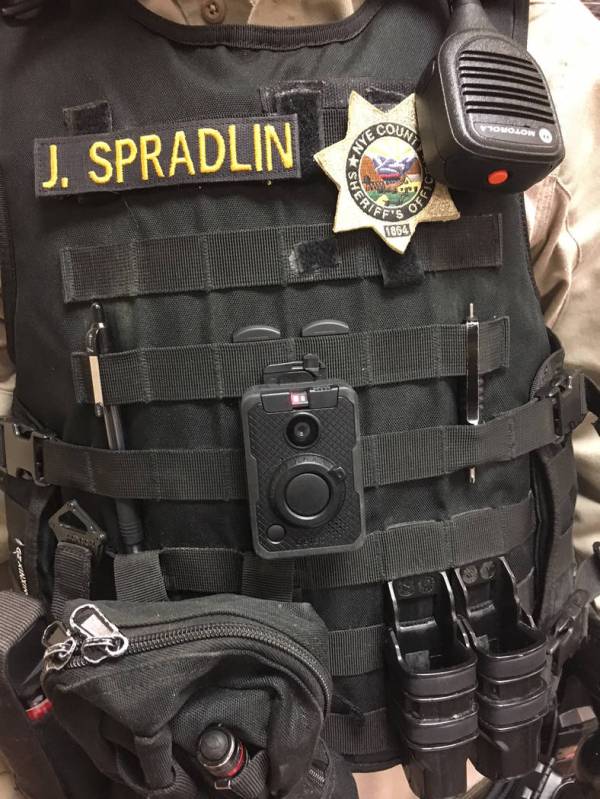
During the 2017 Legislative Session, Nevada lawmakers passed and Gov. Brian Sandoval signed into law Senate Bill 176, requiring law enforcement officers across the Silver State to don body cameras.
With a July 1 deadline to draft policies and procedures for the use of body cameras and put them into action, all peace officers who interact with the public in the course of their official duties must now wear one of these portable recording devices.
In Nye County, the officers of the Nye County Sheriff’s Office have all been assigned their required body cameras, furnished through a $1,103,455 contract with PCN Strategies. Approved in October 2017, the purchase is comprised of 130 body-worn cameras as well as 78 dash and rear-seat cameras to be installed in NCSO patrol vehicles.
The cameras were, “…to be partially funded from the following sources: project G17018, fund 10340 grants in the amount of $155,816.90; 10234 Nye County Sheriff Public Safety Sales Tax in the amount of $515,206.70 from FY17 approved spending plan; and $108,108.00 per year from FY19-22 spending plans, to be submitted to the board for approval at later date,” according to the information provided at the October 2017 meeting.
“BWC (body worn cameras) are an effective law enforcement tool for both the community and the Nye County Sheriff’s Office,” the NCSO Body Worn Cameras Policy and Procedure details. “BWCs help to reinforce the public’s perception of police professionalism and transparency and preserves factual representations of officer-citizen interactions. BWCs have the potential to improve community relations, strengthen public trust in law enforcement, lower the number of citizen complaints, defend deputies against false accusations, increase agency accountability and improve deputy training and evaluation. BWCs assist our organization with accurate, complete and an unbiased perspective of evidence preservation.”
Camera use policy
Under the NCSO policy, except in situations specified as exemptions, all deputies who routinely interact with the public will be assigned a “bodycam” and must activate the camera, ensure it is fully charged and functioning at the beginning of their shift. Even those officers who do not regularly interact with the public are required to use a body camera in the instances that they do come into contact with citizens. If damage or malfunction is detected, the officers must immediately notify a supervisor and seek a replacement camera. As NCSO’s total staff is less than 130 officers, there will be replacements on hand, as well as body cameras for NCSO Auxiliary members to use when performing their duties.
NCSO deputies are also required to activate their bodycams in a variety of situations that do not involve direct interaction with residents. These include execution of search warrants and K9 searches, as well as during code-3 driving, prisoner transport, as soon as possible after an officer-involved traffic accident and during any contact that becomes adversarial.
The 15-page NCSO policy also outlines an array of instances when an officer is not allowed to use their body camera. Examples of prohibited use include recording general activity, non-work-related personal activity and recording in locations where reasonable expectation of privacy exists, such as bathrooms or locker rooms.
The protection of the privacy of the public is also heavily detailed in the policy, with procedures laid down to deal with private residences, medical facilities, demonstrations, victims and witnesses, protected reporters and juveniles. For instance, if an officers is at a resident’s home and that resident does not wish to have the interior of their home videoed, NCSO deputies are permitted, when directly asked to turn off their camera, to request the person to continue the conversation outside. If the resident refuses, the deputy can then turn off the video recording and continue the interaction in audio-only mode.
All recordings created with a bodycam will be stored for a specified period of time, depending on the nature of the recording. Patrol recordings of a felony will be kept indefinitely while those of domestic or DUI misdemeanors will be saved for 10 years. Patrol nonevent recordings will be stored for one year while generic investigation recordings are saved for four years. Detention bookings are kept for one year and jail incidents for two years, with various other time periods detailed.
All body camera recordings by law are defined as public records, unless declared by Nevada Revised Statutes to be confidential. “Requests to inspect BWC recordings can be made in writing, in person or telephonically,” the NCSO policy states. “All requests… must be documented on an NCSO Body Worn Camera Video Public Records Request form which is available on the NCSO website or at any NCSO substation.”
Additional entities
Other law enforcement agencies serving the communities of Nevada have also fully implemented the use of body cameras, including neighboring Esmeralda Sheriff’s Office.
According to Esmeralda County Sheriff Kenneth Elgan, his staff has been utilizing body cameras for several months and they too have patrol vehicle cameras as well. “We were very pleased to find a partner like LensLock,” Elgan said of the company that county was purchasing their cameras from. “The cost to our department was extremely affordable when you take into consideration the level of service, body-worn camera technology and unlimited data storage plan they provide.”
Nevada Highway Patrol troopers are also fully equipped with body cameras, as a result of a law passed in 2015. Senate Bill 176 was an extension of that law, expanding the requirement to all law enforcement rather than only highway patrol officers.
Contact reporter Robin Hebrock at rhebrock@pvtimes.com